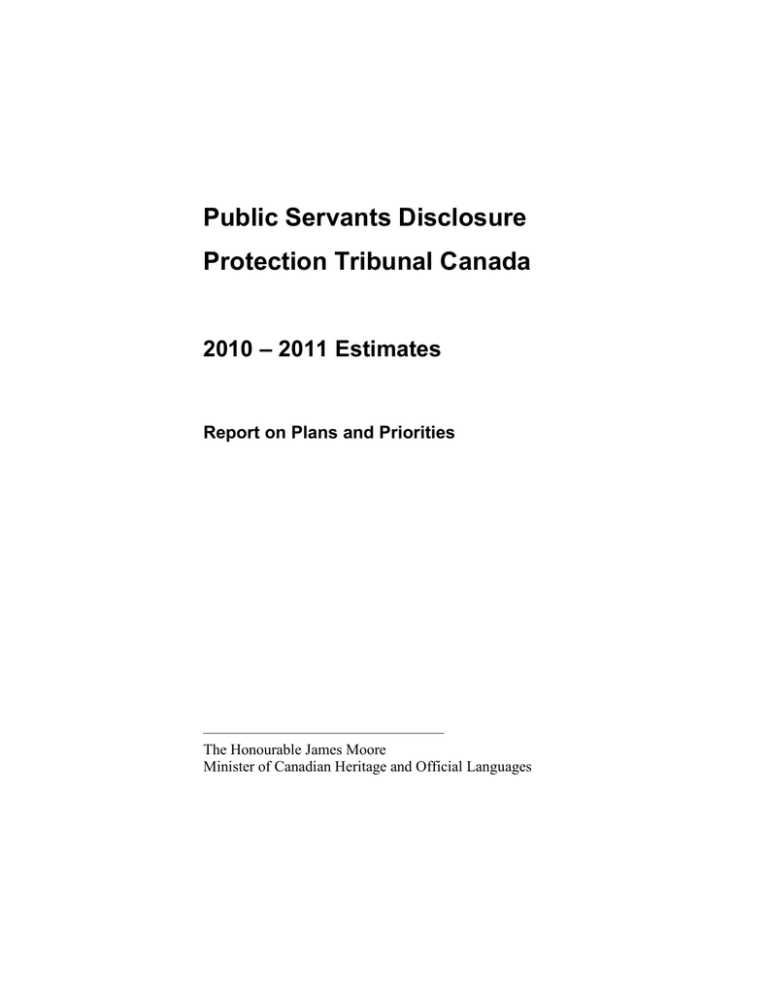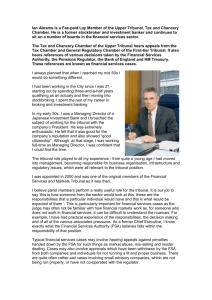Public Servants Disclosure Protection Tribunal Canada 2010 – 2011 Estimates
advertisement

Public Servants Disclosure Protection Tribunal Canada 2010 – 2011 Estimates Report on Plans and Priorities –––––––––––––––––––––––––––––––– The Honourable James Moore Minister of Canadian Heritage and Official Languages Table of Contents Registrar’s Message ....................................................................................................... 1 SECTION I – DEPARTMENTAL OVERVIEW ...................................................... 2 Raison d’être and Responsibilities ................................................................................. 2 Strategic Outcome and Program Activity Architecture (PAA)...................................... 3 Planning Summary ......................................................................................................... 3 Strategic Outcome .......................................................................................................... 4 Contribution of Priorities to Strategic Outcome ............................................................ 5 Risk Analysis ................................................................................................................. 7 Expenditure Profile ........................................................................................................ 7 Voted and Statutory Items.............................................................................................. 7 SECTION II – ANALYSIS OF PROGRAM ACTIVITIES BY STRATEGIC OUTCOME ..................................................................................... 8 Strategic Outcome .......................................................................................................... 8 Benefits to Canadians ..................................................................................................... 9 SECTION III – SUPPLEMENTARY INFORMATION .......................................... 10 Contact Information ..................................................................................................... 10 Registrar’s Message I am pleased to present the 2010-2011 Report on Plans and Priorities for the Public Servants Disclosure Protection Tribunal (the Tribunal). The Public Servants Disclosure Protection Act came into force in 2007. The Act created a regime designed to encourage public servants to disclose wrongdoings by protecting them from reprisals. The Tribunal deals with reprisal complaints referred by the Public Sector Integrity Commissioner. If the Tribunal determines that a reprisal was taken, it has the authority to order a remedy in favour of the complainant and disciplinary action against the person who took the reprisal. It will soon be three years since the Tribunal was established, and it has yet to receive a case. This may be attributable to a lack of awareness by public servants of the disclosure protection regime. Consequently, it is essential that the organisation continue its efforts to raise awareness of the Tribunal and its mandate among public servants. This will constitute our key activity this year. Lisanne Lacroix Registrar and Deputy Head, Public Servants Disclosure Protection Tribunal 1 Section I – Departmental Overview Raison d’être and Responsibilities The raison d’être of the Tribunal is to protect public servants who disclose wrongdoings from reprisals. The Tribunal is one component of the wrongdoing disclosure regime introduced by the Public Servants Disclosure Protection Act 1 (the Act). In addition to the Tribunal, Chief executives, the Public Sector Integrity Commissioner (the Commissioner) and the Treasury Board have responsibilities under the Act. The Tribunal’s success and that of its partners will strengthen accountability and increase public confidence in the integrity of public servants. The Tribunal is an independent quasi-judicial body responsible for dealing with complaints of reprisal referred by the Commissioner. The Act provides for the establishment of a Registry to help the Tribunal in the conduct of its work, with an office in the National Capital Region. 1. S.C., 2005, c. 46. 2 Strategic Outcome and Program Activity Architecture (PAA) In carrying out its mandate, the organization is aiming for the following strategic outcome: Remedial and disciplinary actions that ensure complainants to the Office of the Public Sector Integrity Commissioner are protected against reprisals. The Registry assists the Tribunal in fulfilling its mandate through the Reprisal Hearings Program. This program provides for the effective management of the Tribunal's hearing process. This involves receiving documents, processing cases, maintaining Tribunal records and providing logistical and legal support to Tribunal members. The Registry also informs parties and interested persons of the existence and powers of the Tribunal. Planning Summary Financial Resources (thousands of dollars) 2010–2011 2011–2012 2012–2013 1,828 1,828 1,828 Human Resources (Full-Time Equivalent—FTE) 2010–2011 2011–2012 2012–2013 12 12 12 3 Strategic Outcome: Remedial and disciplinary actions that ensure complainants to the Office of the Public Sector Integrity Commissioner are protected against reprisals. Performance Indicators Targets Number of decisions or orders issued within 250 calendar days from the start of a proceeding 90% of proceedings are completed within 250 calendar days Degree to which the evidence and the written communication filed are shared with all parties Fewer than 10% of adjournments are granted by the Tribunal because of deficiencies in the disclosure of evidence and written communication filed The extent to which the parties have the information needed to exercise their rights The procedural guide is distributed to all parties within five days after the commencement of the proceeding Program Activity Reprisal Hearings Program Forecast Spending 2009–10 1,828 Total Planned Spending Planned Spending (thousands of dollars) 2010-2011 2011-2012 2012-2013 1,828 1,828 1,828 1,828 1,828 1,828 4 Alignment to Government of Canada Outcomes Government Affairs Contribution of Priorities to Strategic Outcome Operational Priorities Hold hearings Inform interested persons, key stakeholders and Canadians Type Already committed to Already committed to Links to Strategic Outcome Description Remedial and disciplinary actions that ensure complainants to the Office of the Public Sector Integrity Commissioner are protected against reprisals Why this is a priority: The Tribunal must be ready to hear reprisal complaints and the Registry to provide support to the Tribunal members as required Remedial and disciplinary actions that ensure complainants to the Office of the Public Sector Integrity Commissioner are protected against reprisals Why this is a priority: Public servants will be more inclined to disclose wrongdoing knowing that they are protected against reprisals It is important that public servants be aware of the existence of the Tribunal and of its powers to order remedies and disciplinary actions Plans for meeting the priority: Negotiate agreements with other tribunals for administrative support when complaints are referred to the Tribunal Meet human resources needs through temporary help Plans for meeting the priority: Continue efforts to inform public servants of the Tribunal’s mandate Monitor issues arising from the application of the Act Already committed to Remedial and disciplinary actions that ensure complainants to the Office of the Public Sector Integrity Commissioner are protected against reprisals Why this is a priority: An independent review of the application and operation of the Act will be conducted in 2012, five years after its coming into force This review will assess the extent to which the procedures established under the Act have been effective Plans for meeting the priority: Conduct a comparative study of protection regimes 5 Management Priorities Management excellence Type Already committed to Links to Strategic Outcome Remedial and disciplinary actions that ensure complainants to the Office of the Public Sector Integrity Commissioner are protected against reprisals Description Why this is a priority: It is important for the Registry to establish a solid management foundation against which to assess and improve organizational performance Plans for meeting the priority: Ensure that all procedures and processes are documented and easily accessible Support employees in their career aspirations and skills development Continue to implement the 10 components of the Management Accountability Framework 6 Risk Analysis The Tribunal was established almost three years ago and it has yet to receive a complaint. This may be attributable to the fact that public servants are not aware that there is a regime in place to protect them against reprisals. Given that the Act is relatively new, it is essential that the organization continue its efforts to raise awareness of the Tribunal and its mandate among public servants. Because the Tribunal is relatively new, it is difficult to predict the number of complaints that it will receive from one year to another. The unpredictability of the workload makes it difficult for the Registry to effectively manage its human and financial resources. Hiring employees on a part-time basis or for definite periods of time when the need arises will enable the Registry to meet the Tribunal’s needs while ensuring that it manages its financial resources responsibly. Expenditure Profile As the Tribunal has not yet received any complaints, there are no trends to report. Voted and Statutory Items (thousands of dollars) Vote # or Statutory Item (S) Truncated Vote or Statutory Wording 2009–2010 Main Estimates 2010–2011 Main Estimates 115 Program expenditures 1,644 1,644 (S) Contributions to employee benefit plans 184 184 1,828 1,828 TOTAL 7 Section II – Analysis of Program Activities by Strategic Outcome Strategic Outcome: Remedial and disciplinary actions that ensure complainants to the Office of the Public Sector Integrity Commissioner are protected against reprisals Program Activity: Reprisal Hearings Program Human Resources (FTE) and Planned Spending (thousands of dollars) 2010-2011 2011-2012 2012-2013 FTE Planned Spending FTE Planned Spending FTE Planned Spending 12 1,828 12 1,828 12 1,828 Program Activity Expected Result Effective management of the Tribunal’s proceedings Performance Indicators Targets Number of decisions or orders issued within 250 calendar days from the start of a proceeding 90% of proceedings are completed within 250 calendar days Degree to which the evidence and written communication filed are shared with all parties Fewer than 10% of adjournments are granted by the Tribunal because of deficiencies in the disclosure of evidence and written communication filed The extent to which the parties have the information needed to exercise their rights The procedural guide is distributed to all parties within five days after the commencement of the proceeding 8 Benefits to Canadians The federal public administration is an important national institution and is part of the essential framework of Canadian parliamentary democracy. Canadians benefit directly from an effective, efficient and ethical public service. They have the right to expect public servants to conduct themselves in an ethical manner and in accordance with their legal obligations. The Tribunal is one component of the wrongdoing disclosure regime introduced by the Act. Chief executives, the Commissioner and Treasury Board also have responsibilities under the Act. The Tribunal’s success, and that of its partners, will foster an environment in which employees are able to openly voice their concerns without fear of reprisals. It will foster the establishment in the public service of a culture based on the highest ethical standards. 9 Section III – Supplementary Information Contact Information Public Servants Disclosure Protection Tribunal Canada 270 Albert Street, suite 1200 Ottawa, Ontario K1P 5G8 Telephone: 613-943-8310 Facsimile: 613-943-8325 E-mail: Tribunal@psdpt-tpfd.gc.ca Web site: www.psdpt-tpfd.gc.ca 10




